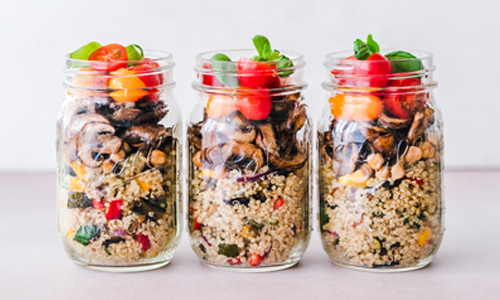Breastfeeding is a journey that comes with its own set of joys and challenges, and one of the most common concerns for nursing moms is maintaining a healthy milk supply. While every mom’s experience is unique, nutrition plays a key role in supporting both your well-being and your ability to provide for your baby. The foods and fluids you consume while breastfeeding can have a significant impact—not just on your energy and recovery, but also on your milk production.
If you’re looking for practical ways to nourish yourself and support your milk supply, you’re in the right place. Here are four nutrition-focused tips to help you along the way:
1. Eat a balanced, nutrient-rich diet
Breastfeeding can increase your caloric needs by 300–400 calories per day. Focus on whole, nutrient-dense foods like vegetables, fruits, lean proteins, and whole grains to nourish both you and your baby. Continuing your prenatal or a breastfeeding-specific multivitamin can help fill any gaps—check with your healthcare provider for guidance.
2. Stay hydrated:
Even mild dehydration can impact milk supply, but overhydration can, too. The best approach: keep water handy and sip when you’re thirsty. Water is best, while sugary drinks should be limited. Check with your doctor on safe caffeine intake, since caffeine can have a mild diuretic effect.
3. Consider adding herbs that may act as galactagogues:

Some herbs, called galactagogues, may help boost milk supply. Fenugreek is one of the most studied, with research showing it can increase milk volume, breastfeeding frequency, and maternal prolactin levels (a key hormone for milk production). Fennel and aniseed are other herbs traditionally used for this purpose.
An easy way to add these herbs to your daily routine is through Milk’s Up Organic Lactation Tea, created in collaboration with Lansinoh. This caffeine-free, 100% organic blend combines fenugreek, fennel, aniseed, lemon verbena, and rosemary—herbs linked to supporting prolactin and healthy milk production. It’s also vegan, gluten-free, plastic-free, and can be re-brewed for multiple cups.
As with any herbal supplement, consult your healthcare provider first, especially if you have medical conditions or are on medication.
4. Build your support system
Breastfeeding is easier with a team—whether that’s family, friends, lactation consultants, or fellow moms who understand the journey. A strong support network can help you stay confident and find solutions when challenges arise.
Breastfeeding can be incredibly beautiful and rewarding for you and your baby. Have confidence in yourself, make healthy food choices, stay hydrated, listen to your body, check with the experts, and rely on your tribe. You got this!
References:
1Eidelman, A. I., & Schanler, R. J. (2012). Breastfeeding and the Use of Human Milk. Journal of the American Academy of Pediatrics, 129 (3), e827-e841. DOI:10.1542/peds.2011-3552
2Centers for Disease Control and Prevention. (2020). Breastfeeding: Facts. Retrieved from https://www.cdc.gov/breastfeeding/data/facts.html
3Ruowei, L., Fein, S. B., Chen, J., & Grummer-Strawn, L. M. (2008). Why Mothers Stop Breastfeeding: Mother’s Self-reported Reasons for Stopping During the First Year. Journal of the American Academy of Pediatrics, 122 (2), S69-S76. DOI:10.1542/peds.2008-1315i
4Bazzano, A. N., Hofer, R., Thibeau, S., Gillispie, V., Jacobs, M., & Theall, K. P. (2016). A Review of Herbal and Pharmaceutical Galactagogues for Breast-Feeding. The Ochsner journal, 16(4), 511–524.
All content found on the Lansinoh.com website, including: text, images, audio, or other formats were created for informational purposes only. The content is not intended to be a substitute for professional medical advice, diagnosis, or treatment. Always seek the advice of your physician or other qualified health provider with any questions you may have regarding a medical condition. Never disregard professional medical advice or delay in seeking it because of something you have read on this website.
Author:
Laura King, RDN, LDN, is a registered and licensed Dietitian Nutritionist in Maryland. She has spent the last 16 years working in healthcare and the nutrition industry, where she most recently used evidenced-based research to create innovative solutions in early life nutrition. Laura believes that breast milk represents the nutritional gold standard for infant feeding, and that supporting moms' nutrition through their breastfeeding journeys is paramount.
You may also like…
Making the Mind-Milk Connection
Many new moms find themselves feeling a broad range of emotions about their new role and the responsibilities that go along with it. Combined with the regular stressors and responsibilities of life, it’s easy to see how we can begin to feel overwhelmed.













